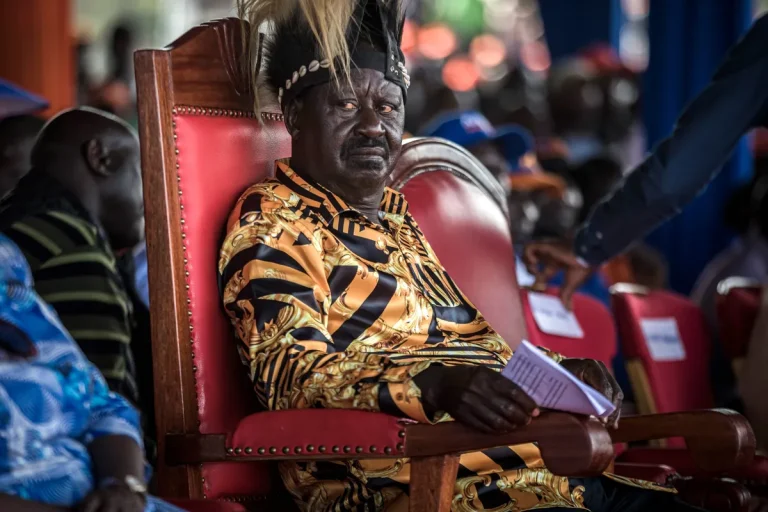Kenya’s political stalwart, Raila Amolo Odinga, has passed away at the age of 80. The former Prime Minister of Kenya died on the morning of October 15, 2025, after collapsing during a morning walk at an Ayurvedic hospital in Kochi, India, where he had been undergoing treatment for undisclosed medical conditions. Despite immediate efforts to revive him, doctors at Devamatha Hospital in Koothattukulam, Kerala, confirmed his death at 9:52 AM Indian time, marking the end of an era in Kenyan politics.
Raila Odinga, known affectionately as “Baba”, was one of the most influential figures in Kenya’s political landscape. He served as Prime Minister from 2008 to 2013, following a turbulent period in Kenyan politics that saw him at the forefront of calls for electoral reform and the promotion of multiracial democracy. Throughout his life, Odinga championed a vision of free and fair elections and was a staunch advocate for devolution, which now forms the backbone of Kenya’s governance structure.
Odinga’s legacy stretches far beyond his tenure as Prime Minister. As the leader of the Orange Democratic Movement (ODM), he spearheaded Kenya’s opposition and made five bids for the presidency, each time accusing the government of electoral fraud. His most recent attempt, in 2022, saw him contesting for the presidency for the fifth time, only to lose again to William Ruto.
Despite the defeats, Odinga’s political career was marked by a series of significant achievements. He was instrumental in securing the peace agreement that ended the 2007-2008 post-election violence and led the Building Bridges Initiative (BBI) in 2018, aimed at fostering national unity. His role in Kenya’s independence struggle and his later contributions to Africa’s democratic ideals earned him global recognition.
The Last Days of Raila Odinga
In the days leading to his death, Odinga had been in Kochi, India, seeking medical care at a renowned Ayurvedic hospital, known for treating various ailments through traditional medicine. His daughter, Rosemary Odinga, had accompanied him, continuing her own treatment for partial eyesight recovery, a process that had been successful in previous years at the same facility.
Sources close to the family revealed that Raila Odinga’s health had been deteriorating over the past few months, with various treatments being sought in both Kenya and abroad. Despite his illness, Odinga remained politically active, frequently calling for democratic reforms and challenging electoral processes within Kenya.
The Kenyan government, through the Foreign Ministry, has confirmed that Indian authorities have begun repatriation procedures in line with the Foreigners Regional Registration Office (FRRO) protocols. A formal statement from the Kenyan government is expected in the coming hours.
Raila Odinga’s Remarkable Legacy
Born on January 7, 1945, in Maseno, Kenya, Odinga was the son of Jaramogi Oginga Odinga, the first Vice President of Kenya, and a key figure in the Kenyan independence movement. Raila Odinga’s political career began in the 1970s when he returned to Kenya from East Germany after studying engineering. He founded the East African Spectre, a company that became the country’s leading manufacturer of liquid petroleum gas cylinders.
However, Odinga’s political journey was not without controversy. He was imprisoned multiple times, notably after being accused of orchestrating a failed 1982 coup attempt against the Moi administration. His detention became a symbol of the repressive rule of Daniel arap Moi, the second President of Kenya. After his release in 1988, Odinga played a pivotal role in the push for multi-party democracy, which culminated in the 1992 General Elections.
Raila Odinga’s leadership in Kenya’s opposition politics cannot be overstated. He was a beacon of hope for many disenfranchised Kenyans who sought freedom, justice, and a fair electoral process. His tenure as Prime Minister in the Grand Coalition government (2008-2013) was fraught with challenges, but he managed to broker peace between the warring factions of the 2007-2008 post-election violence, which resulted in the deaths of over 1,000 people and the displacement of hundreds of thousands.
In 2017, Odinga’s election loss sparked a constitutional crisis, with Odinga himself declaring himself the People’s President in a controversial move after boycotting the presidential rerun. This standoff culminated in the famous “handshake” between him and President Uhuru Kenyatta in 2018, which brought an end to Kenya’s political deadlock and initiated the Building Bridges Initiative (BBI).
Raila Odinga’s Family and Personal Life
Raila Odinga is survived by his wife, Ida Odinga, and their four children: Fidel, Rosemary, Raila Jr., and Winnie. His eldest son, Fidel Odinga, passed away in 2015, which was a huge blow to the family and the political leader’s morale.
Odinga’s personal life was marked by his deep Christian faith and his admiration for global leaders such as Barack Obama, with whom he shared a cousin relationship through his father’s side of the family. Raila also had a great passion for soccer and was a lifelong fan of Arsenal FC, even playing for Luo Union (now Gor Mahia) during his youth.
A Nation in Mourning
Odinga’s death has sent shockwaves across Kenya and the wider African continent. Political leaders, including President William Ruto, have expressed their heartfelt condolences to the family and the nation. Flags have been lowered to half-mast, and a national mourning period is expected as Kenya pays tribute to a man who shaped its political destiny.
Kenya’s political arena has lost one of its most iconic and divisive figures. Raila Odinga’s death marks the end of an era in Kenyan politics, and his absence will leave a significant void, both within the Orange Democratic Movement (ODM) and the broader opposition.
A Final Farewell
Raila Odinga’s contributions to Kenya and Africa’s democratic struggle will be remembered for years to come. His legacy is etched in the hearts and minds of those who fought alongside him and those who opposed him. Raila Odinga, though no longer with us, remains a symbol of resilience, struggle, and the unyielding fight for justice.

